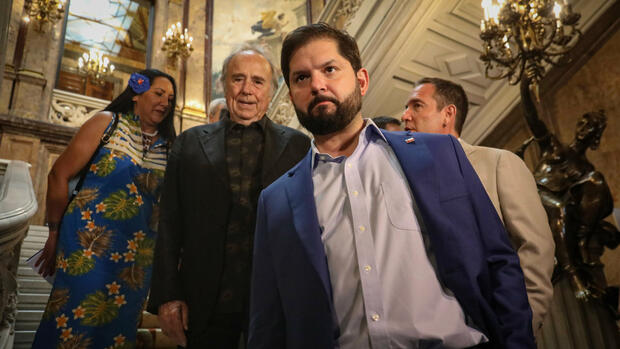The left-wing President of Chile governs the country moderately. Europe could benefit from this.
(Photo: IMAGO/ZUMA Wire)
ElSalvador Chileans have a reputation in Latin America for being reliable, serious and determined. Gabriel Boric, the 37-year-old President of Chile, just showed at the Brussels summit that there must be something to this cliché.
By Tuesday, more than 50 heads of state from the EU and Latin America had gathered there for their first summit in eight years. The meeting was intended to herald a turning point in relations between the two continents. They want to work together more intensively in the future, according to the good intentions.
But then the government representatives had not prepared anything on which they could have agreed: Above all, it was expected that the South American free trade area Mercosur would make further progress with the EU. The agreement, as Brazilian President Luiz Inácio Lula da Silva announced after a visit by Federal Chancellor Olaf Scholz to Brasília at the beginning of the year, is “on the home straight”.
In fact, however, Brazil has failed to work out a joint negotiation offer from Mercosur in recent months.
Quite different Gabriel Boric from Chile. He kept what he promised EU Commission President Ursula von der Leyen and Chancellor Olaf Scholz a month ago – and thus saved the summit: The Andean country signed a declaration of intent with the EU for a future close partnership on sustainable raw material value chains.
Future partnership in raw material supplies
This is of great importance for Europe: Chile produces the raw materials lithium and copper, which are important for the energy transition – and could also soon become a major supplier of green hydrogen.
The EU not only wants to support the sustainable production of raw materials and obtain them from there. European companies will also invest heavily locally in the Andean country. In the future, Chile could not only supply lithium, but possibly also produce batteries for electric cars.
For the EU, the agreement is an important first step in implementing the Global Gateway Strategy – Europe’s response to China’s Silk Road Initiative. The EU also wants to offer its partners capital for investments in infrastructure, as Beijing has been doing on a large scale worldwide for more than a decade. So far, the EU has lacked the major flagship projects. Chile’s President Boric could now ensure that such a thing arises.
Foreign trade and diplomatic success in Brussels is extremely important for the former student leader in order to increase his popularity in his own country: since his clear election victory a year and a half ago, Chileans have been disappointed with the youngest president in their history.
>> Read here: Today, Europe needs Latin America more than the other way around
Only 30 percent of the population judge him positively. This is because the country, which has been economically successful for decades, has hardly been growing lately. At the same time, problems with rising crime rates and uncontrolled migration have led to a shift to the right in politics. Several important legislative projects that Boric and his left-green coalition stood for – such as the new left-wing draft constitution or the tax reform – have failed miserably.
For pragmatic reasons, the president has long since given up many of his left-wing principles. For the first time, he relies on intensive cooperation with the police in order to be able to solve the security problem. For Boric that would have been an absolute taboo not long ago.
Boric could be a godsend for Europe
(Photo: AP)
Europeans, however, would classify Boric’s government as modern and social democratic. Women and men are equally represented in his cabinet. The country’s foreign policy should be feminist, Boric demanded when he took office and promised the indigenous people far-reaching special rights. Apparently Boric now wants to show his compatriots that his modern left-wing politics can definitely be an advantage in negotiations like those with the Europeans.
Breaking a taboo among the left in South America
Unlike many of the left-wing heads of state in Latin America, Boric openly criticizes human rights violations in Nicaragua, Cuba and Venezuela – a taboo that has been broken among the left in Latin America.
Boric had just made himself unpopular with Brazil’s Lula and Colombia’s Gustavo Petro at a South America summit when he denounced Venezuela’s human rights policy. Even now, some heads of state may not have liked that he stole the show from them.
More: Why Europe’s chances in Latin America are getting worse and worse
